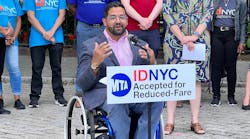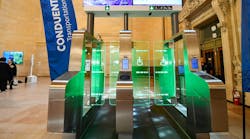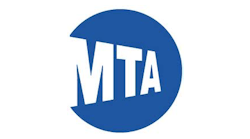MTA is ready to combat toll and fare evasion with Blue Ribbon Panel recommendations
Metropolitan Transportation Authority (MTA) provided an update on its progress implementing recommendations from the Blue-Ribbon Panel Report on Fare and Toll Evasion’s report, which was published in May. The authority has committed to fully implementing the panel’s recommendations, which focus on the “Four Es”: Education, Equity, Environment and Enforcement. MTA said the update provided July 19 will be the first of ongoing progress updates the authority plans to share.
The Blue-Ribbon Panel’s report determined the authority loses an estimated $690 million to fare evasion and unpaid tolls. Among the panel’s recommendations were investing in modern faregates, expanding MTA’s Fair Fares program, committing to “precision policing,” reducing the impact of fare evasion enforcement on New Yorkers of color and shifting to civil enforcement rather than criminal.
“By combining education, enforcement and infrastructure improvements, we can tackle the root causes of evasion – increasing paid ridership and equity at the same time,” said Rosemonde Pierre-Louis and Roger Maldonado, Blue-Ribbon Panel co-chairs. “We are glad to see MTA leadership has embraced our panel’s report and look forward to supporting the implementation efforts.”
Most of MTA’s loss of fare revenue comes from fare evasion on buses and subways. Armed with the panel’s recommendations, MTA reports the following actions:
Equity: New York City’s (NYC) budget included greater Fair Fares eligibility and funding and the authority is working to enroll more customers in its own reduced-fare programs. MTA accepts the IDNYC card as an official form of identification for these reduced-fare programs.
Education: MTA station agents and representatives at Customer Service Centers hand out flyers advertising Fair Fares and the Reduced-Fare programs and representatives from the NYC Department of Social Services regularly attend NYCT Transit Talk events in stations and assist with Fair Fares enrollment.
Environment and Enforcement: MTA is working to minimize unauthorized use of emergency gates in subways by replacing all 1,620 access key locks in the system with highly secure locks. The authority has added more civilian gate guards and will release a Request for Information later in 2023 for the next generation of fare arrays. On buses, MTA will redeploy its EAGLE Teams to handle fare evasion enforcement on local bus service.
For MTA’s commuter railroad, Metro-North Railroad and Long Island Rail Road, messaging campaigns will focus on the importance of fare payments, and the railroads will continue to leverage the use of the authority’s TrainTime app, which allows for train tickets to be purchased before boarding.
To limit toll evaders, MTA is working on reciprocity agreements with other states to allow non-New York drivers caught evading tolls to be penalized in their home state. The use of portable license plate readers will progress, and the authority is working to advocate for proposed legislation that would bolster enforcement of toll evasion.
“Fare evasion is more than just a budget issue, it’s a social issue that tears at the spirit of fairness and mutual respect that New Yorkers need and expect,” said MTA Chair and CEO Janno Lieber. “Making some of the panel’s key recommendations a reality is going to be an all-hands effort, and I’m looking forward to working with New York City public schools, community groups, the courts, District Attorneys, NYPD, the state legislature and other partners to make progress in reducing fare evasion.”

Mischa Wanek-Libman | Group Editorial Director
Mischa Wanek-Libman is director of communications with Transdev North America. She has more than 20 years of experience working in the transportation industry covering construction projects, engineering challenges, transit and rail operations and best practices.
Wanek-Libman has held top editorial positions at freight rail and public transportation business-to-business publications including as editor-in-chief and editorial director of Mass Transit from 2018-2024. She has been recognized for editorial excellence through her individual work, as well as for collaborative content.
She is an active member of the American Public Transportation Association's Marketing and Communications Committee and served 14 years as a Board Observer on the National Railroad Construction and Maintenance Association (NRC) Board of Directors.
She is a graduate of Drake University in Des Moines, Iowa, where she earned a Bachelor of Arts degree in Journalism and Mass Communication.







